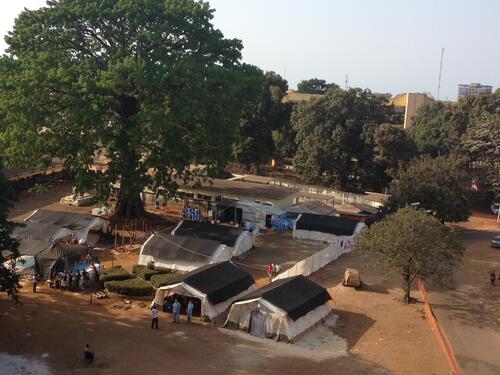Conakry, 7 April 2014 – A number of patients have been discharged from Ebola treatment centres in Guinea after successfully beating the Ebola virus, says the international medical organisation Médecins Sans Frontières (MSF). At the same time, MSF’s emergency teams are facing challenges in tackling the epidemic, with work currently suspended in one of its three Ebola treatment centres.
Ebola is associated with high mortality rates and there is no specific treatment for the virus. However, patients’ chances of survival increase if they receive proper care, including staying hydrated and receiving treatment for secondary infections. “When the first patient came out from the treatment centre, I was so happy and the whole team was cheering,” says Marie-Claire Lamah, a Guinean doctor working in MSF’s Ebola treatment centre in Donka hospital in the capital Conakry. MSF is supporting the Ministry of Health in its attempts to stem the outbreak, which has seen 151 suspected cases and 95 deaths to date, according to Guinean health officials.
MSF activities suspended in Macenta
In Macenta, in southeast Guinea, MSF activities have been suspended following an incident where local people threw stones at buildings and vehicles, under the mistaken impression that the disease had been brought into the country by MSF. None of the MSF team was injured in the incident.
The two Ebola patients who were in the treatment centre in Macenta remain there under the care of a Ministry of Health doctor, who has received training from the MSF team over the past 10 days in caring for Ebola victims.
Patient awareness teams
“Of course we understand that the local population is concerned,” says MSF emergency coordinator Henry Gray. “We have seen similar reactions in other countries in the past. In these situations, ensuring that local populations have a good understanding of the disease and its associated risks is key. In Macenta, we had patient awareness teams in place, but it is very difficult to try and inform people in their own language about the virus, and at the same time do everything that is needed to stop the outbreak.” Negotiations with local authorities are ongoing, and MSF plans to restart its activities in Macenta as soon as possible.
MSF’s activities continue in Guéckédou, another town in southeast Guinea, where MSF has set up an isolation unit. In Conakry, the Ebola treatment centre set up by MSF has been increased from 10 beds to 30, for both high-risk and low-risk patients. “We currently have eight patients in the facility in Conakry, and we wanted to increase capacity to ensure we have the space if we need it,” says Henry Gray.
Tracking the spread of the disease
In Conakry and elsewhere, MSF and other health organisations are sending teams into the community to trace the contacts of existing Ebola patients to try and track the spread of the disease.
MSF is also working with local communities to ensure that discharged patients who have beaten the virus can return home safely, and that everyone understands they are no longer contagious. “We know that stigma can be difficult to deal with for patients that have recovered,” says MSF health promoter Ella Watson-Stryker. “We explain to the families and neighbours that the patient is now negative and doesn’t present any risks to anyone – they can be kissed, touched and hugged without any risk of contagion.” MSF has some 60 international staff currently working in Guinea, and has flown in more than 40 tons of supplies to tackle the epidemic.
Support in Liberia
After Ebola cases were reported in neighbouring Liberia, MSF sent an Ebola specialist to provide training and improve the small isolation unit set up by Liberia’s Ministry of Health. On 6 April, MSF flew in medical supplies and isolation materials from Brussels to the capital, Monrovia, while an MSF team will be on the ground on 7 April to provide further support.



